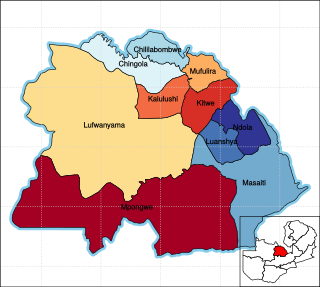 |
|---|
Mpongwe is a constituency of the National Assembly of Zambia. It encompasses the town of Mpongwe and a large rural area within Mpongwe District in the Copperbelt Province. [1]
 |
|---|
Mpongwe is a constituency of the National Assembly of Zambia. It encompasses the town of Mpongwe and a large rural area within Mpongwe District in the Copperbelt Province. [1]

Copperbelt Province is a province in Zambia which covers the mineral-rich Copperbelt, and farming and bush areas to the south. It was the backbone of the Northern Rhodesian economy during British colonial rule and fuelled the hopes of the immediate post-independence period, but its economic importance was severely damaged by a crash in global copper prices in 1973. The province adjoins the Haut-Katanga province of the Democratic Republic of the Congo, which is similarly mineral-rich.

Elections in Zambia take place within the framework of a multi-party democracy and a presidential system. The President and National Assembly are simultaneously elected for five-year terms.

Kapiri Mposhi is a Zambian town and the seat of the Kapiri Mposhi District in Central Province. Located north of Lusaka, it stands on the Great North Road and is significant for the railway connection between the Zambia Railways line from Kitwe to Lusaka and the western terminus of the Tanzania-Zambia Railway Authority from Dar es Salaam since 1976.

The National Assembly is Zambia's unicameral legislative body. Between 1972 and 1990, Zambia was a one-party state with the United National Independence Party (UNIP) as the sole legal party.

The ten provinces of Zambia are divided into a total of 116 districts as of 2018.
Myene is a cluster of closely related Bantu varieties spoken in Gabon by about 46,000 people. It is perhaps the most divergent of the Narrow Bantu languages, though Nurse & Philippson (2003) place it in with the Tsogo languages (B.30). The more distinctive varieties are Mpongwe (Pongoué), Galwa (Galloa), and Nkomi.
This article gives lists of the National Monuments and other historic sites of Zambia, with a one- or two-line description providing links to details given on other pages.

The speaker of the National Assembly of Zambia is a position established under Article 69(1) of the constitution. The speaker is elected by members of the Assembly from anyone eligible to be elected to the National Assembly, but cannot be a sitting member.

Lufwanyama District with headquarters at Lufwanyama is a large rural undeveloped district in the west of Copperbelt Province. On a number of maps it is mixed up with Mpongwe District and Masaiti District. At one time these three districts were known as 'Ndola Rural'. As of the 2022 Zambian Census, the district had a population of 133,060 people.

Kapiri Mposhi District is a district of Zambia, located in Central Province. The capital lies at Kapiri Mposhi. As of the 2022 Zambian Census, the district had a population of 371,068 people.

Masaiti District is a district of Zambia, located in Copperbelt Province. The capital lies at Masaiti. As of the 2000 Zambian Census, the district had a population of 177,829 people. It is divided into two constituencies, namely Masaiti constituency and Kafulafuta constituency.

Mpongwe District is a district of Zambia, located in Copperbelt Province. The capital lies at Mpongwe. As of the 2022 Zambian Census, the district had a population of 135,486 people.

General elections were held in Zambia on 5 December 1973. They were the first elections held since the country was formally declared a one-party state in August, with the United National Independence Party (UNIP) as the only legally permitted party. UNIP leader Kenneth Kaunda was automatically elected to a third five-year term as President, and was confirmed in office via a referendum in which 88.8% of voters approved his candidacy. UNIP also won all 125 seats in the National Assembly. Voter turnout was 39% of the 1,746,107 registered voters for the presidential election, and 33% for the National Assembly election.
Mpongwe may refer to:

Kafubu River is a river in the Copperbelt Province of Zambia. It starts in Ndola and it cuts through the city's main area westwards into the area in-between Levy Mwanawasa Stadium and Masala before turning southwards after Masala and continuing through the Luanshya and Masaiti districts to join the Kafue River.

Virginie Ambougou was a Gabonese royal and politician. The Oga of the Assiga clan, in 1961 she and Antoinette Tsono were elected to the National Assembly, becoming its first female members.

Mulobezi is a constituency of the National Assembly of Zambia. It covers Mulobezi and surrounding areas in Mulobezi District of Western Province.

Mangango is a constituency of the National Assembly of Zambia. It covers part of Kaoma District in Western Province.